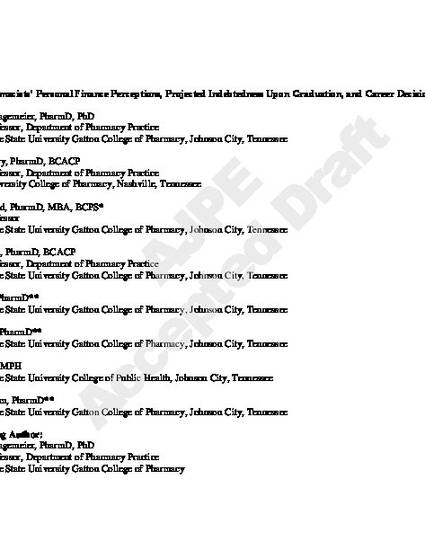
Objectives: To evaluate the extent to which students’ personal finance perceptions, projected student loan indebtedness, and demographic characteristics predict post-PharmD career intentions.
Methods: Students at three pharmacy colleges completed a 31-item survey instrument that assessed personal finance perceptions, self-efficacy beliefs, anticipated student loan debt upon graduation, postgraduate intentions, anticipated practice setting upon graduation, and demographic characteristics. Logistic regression models were used to examine the extent to which personal finance perceptions, student loan indebtedness, and demographic characteristics predicted postgraduate intentions and anticipated practice setting.
Results: A total of 763 usable responses were obtained (response rate=90.3%). Students reported an anticipated personal student loan debt mean at graduation of $162,747±87,093 and an estimated 7.4±5.8 years to pay off non-mortgage debt post-graduation. Fifty-three percent of students reported planning to practice in a community pharmacy setting post-graduation, and 54% indicated intentions to enter practice directly. Student loan indebtedness was not a significant predictor of planning to pursue postgraduate training. There was a significant association between debt influence and pressure perceptions and pursuance of postgraduate training (aOR=0.78;p=0.009). The odds of indicating hospital (vs. chain community) pharmacy as the anticipated setting decreased 36% with every 1-point increase in debt influence and pressure perceptions (aOR=0.64;p<0.001
Conclusions: Perceived debt pressure and influence predicted intention to enter practice directly (vs. pursuing postgraduate training) and selection of chain community pharmacy (vs. hospital pharmacy). Student loan indebtedness was not a significant predictor of postgraduate training intentions. Interventions that equip students to manage pressure associated with student loan debt should be explored.
Available at: http://works.bepress.com/nick-hagemeier/24/

Copyright American Journal of Pharmaceutical Education. This document was originally published in American Journal of Pharmaceutical Education.